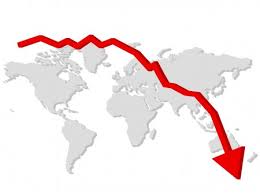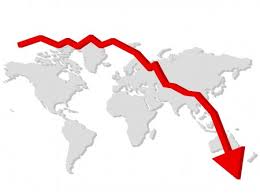
The International Monetary Fund (IMF) said on Monday that a global recession will take place in 2020 because of the coronavirus pandemic and the economic hit of the virus all over the world will be worse than the recession that was seen during the 2008-09 global financial crisis. However the IMF also said that the global economy will bounce back in 2021.
The already announced extraordinary fiscal actions of governments of many of the countries that have been hit by the virus pandemic to spruce up the health systems and provide protection to the companies and workers affected by the virus spread was welcomed by the IMF Managing Director Kristalina Georgieva. She also applauded the various measures that have been taken by the central banks to ease monetary policy across the world. "Even more will be needed, especially on the fiscal front," she said.
The comments were made by Georgieva after a video conference call with the finance ministers of the G20 countries - the 20 largest economies of the world. She said that the G20 finance ministers agreed about the need for consorted solidarity of countries across the globe.
"The human costs of the coronavirus pandemic are already immeasurable and all countries need to work together to protect people and limit the economic damage," Georgieva said.
Lockdown measures to contain the rapidly spreading virus are being imposed by more countries as the coronavirus pandemic infected more than 337,500 people across the world and killed over 14,600.
While saying that its outlook for global growth was negative, the IMF chief said that the global body now expected "a recession at least as bad as during the global financial crisis or worse."
In predictions made earlier this month, the IMF had not made any prediction of a global recession but had warned that the global economic growth for 2020 will be well below the 2.9 per cent growth as was seen in 2019. Last year, the trade wars the global growth rate was pushed to its slowest since 2009 when there was a contraction of 0.7 per cent.
While expressing hope that the global economy will recover in 2021, Georgieva said on Monday that to achieve this, countries will need to prioritize containment and strengthen their health systems.
"The economic impact is and will be severe, but the faster the virus stops, the quicker and stronger the recovery will be," she said.
Emergency finance would be stepped up massively by the IMF, Georgieva said, and noted that requests for help form the global bank have already been made by 80 countries and that the IMF was ready to help them from its lending capacity of $1 trillion.
Significant challenges, including outward capital flows, are faced by many emerging markets and low-income countries even though the crisis can generally be dealt with by the more advanced economies.
Georgieva said that since the start of the coronavirus crisis, the largest capital outflow from markets of emerging economies had been withdrawn by investors which amounted to about $83 billion.
(Source:www.channelnewsasia.com)
The already announced extraordinary fiscal actions of governments of many of the countries that have been hit by the virus pandemic to spruce up the health systems and provide protection to the companies and workers affected by the virus spread was welcomed by the IMF Managing Director Kristalina Georgieva. She also applauded the various measures that have been taken by the central banks to ease monetary policy across the world. "Even more will be needed, especially on the fiscal front," she said.
The comments were made by Georgieva after a video conference call with the finance ministers of the G20 countries - the 20 largest economies of the world. She said that the G20 finance ministers agreed about the need for consorted solidarity of countries across the globe.
"The human costs of the coronavirus pandemic are already immeasurable and all countries need to work together to protect people and limit the economic damage," Georgieva said.
Lockdown measures to contain the rapidly spreading virus are being imposed by more countries as the coronavirus pandemic infected more than 337,500 people across the world and killed over 14,600.
While saying that its outlook for global growth was negative, the IMF chief said that the global body now expected "a recession at least as bad as during the global financial crisis or worse."
In predictions made earlier this month, the IMF had not made any prediction of a global recession but had warned that the global economic growth for 2020 will be well below the 2.9 per cent growth as was seen in 2019. Last year, the trade wars the global growth rate was pushed to its slowest since 2009 when there was a contraction of 0.7 per cent.
While expressing hope that the global economy will recover in 2021, Georgieva said on Monday that to achieve this, countries will need to prioritize containment and strengthen their health systems.
"The economic impact is and will be severe, but the faster the virus stops, the quicker and stronger the recovery will be," she said.
Emergency finance would be stepped up massively by the IMF, Georgieva said, and noted that requests for help form the global bank have already been made by 80 countries and that the IMF was ready to help them from its lending capacity of $1 trillion.
Significant challenges, including outward capital flows, are faced by many emerging markets and low-income countries even though the crisis can generally be dealt with by the more advanced economies.
Georgieva said that since the start of the coronavirus crisis, the largest capital outflow from markets of emerging economies had been withdrawn by investors which amounted to about $83 billion.
(Source:www.channelnewsasia.com)





